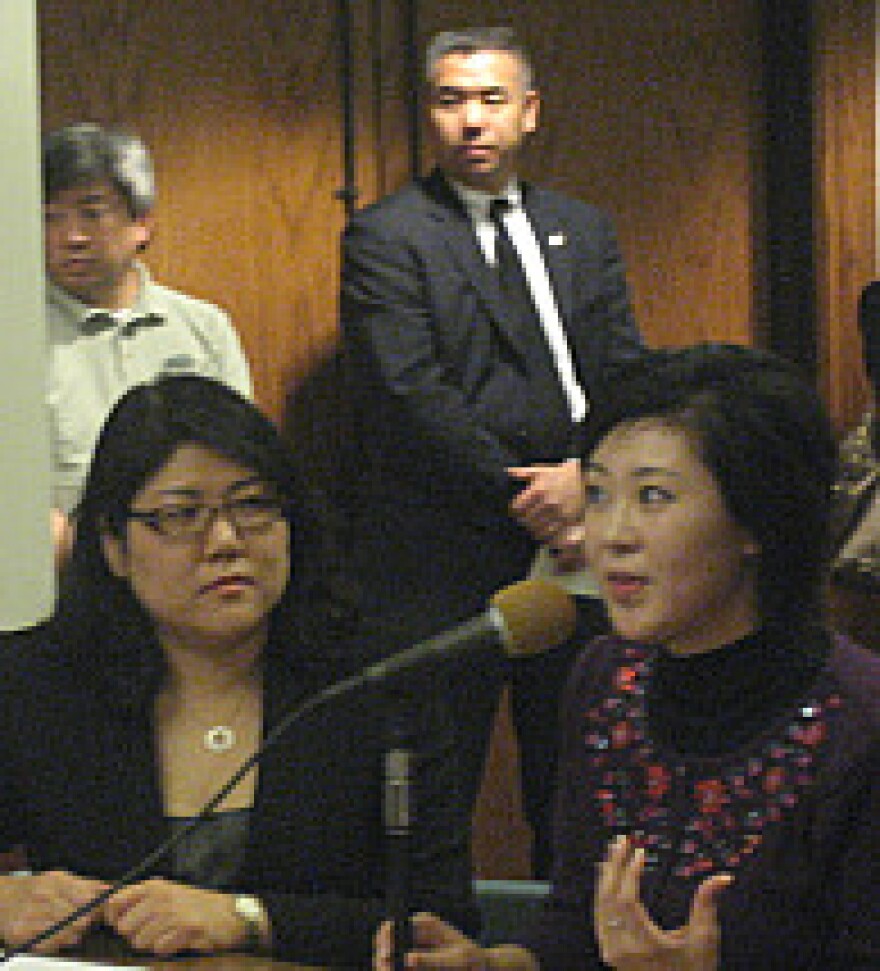This story is free to read because readers choose to support LAist. If you find value in independent local reporting, make a donation to power our newsroom today.
This archival content was originally written for and published on KPCC.org. Keep in mind that links and images may no longer work — and references may be outdated.
Koreatown angry over LA's proposed redistricting plan

A plan to redraw city council districts in Los Angeles is stirring tension in Koreatown.
Hundreds of Korean-Americans crowded a hearing at the Wilshire Ebell Theater last week expressing anger and dismay that the city’s Citizens Redistricting Commission has proposed splitting Koreatown into two council districts.
"We’ll fight using any means to keep Koreatown whole," attorney James Beck said.
Beck expressed an oft-heard sentiment - that elected officials tap Koreatown business owners for political donations but refuse to give the area real political power.
“Our community will no longer sit idly and be pimped out like a two-dollar whore," he said.
Right now, four different council districts include parts of Koreatown. So the new map that splits the area into only two districts might be viewed as an improvement.
"Not really," Grace Yoo said. Yoo, who heads the Korean American Coalition said her community should have one council member to hold accountable for its needs.
“It means you can provide one staff person who speaks the language fluently and can assist the people to receive basic service needs," Yoo said. "Right now, people don’t know where to call or when they do call a city council persons office, it's sort of ‘oh, that Korean staffer isn’t here.'“
Yoo points out that voters have elected only one Asian-American to the L.A. City Council, and that placing Koreatown in one council district might help change that.
But Koreatown, which sits just west of downtown L.A., can be elusive. Yoo said that the city’s official boundaries don’t cover all of it – and that a council district must include all of the Wilshire Center Koreatown Neighborhood Council area and extend north to 3rd street.
That irks Raul Claros of a group called the Latino Coalition of Los Angeles. He prefers the smaller definition of Koreatown.
“They work there, they have businesses there, they build skyscrapers, they’ve reflected Koreatown to look like Korea. Ok great, fine," Claros said. We’ve recognized an area. No one else has that. Central Americans don’t have that. Mexicans don’t have that.”
He said Latinos comprise the majority of the Koreatown area, and that he wants the city to designate one 14 square-block radius the Salvadoran Community Corridor.
Following the hearing, Claros started to explain his opposition to a wider definition of Koreatown to a Korean TV interviewer. Yoo tried to interrupt.
"That’s the type of disrespect that I’m talking about," Claros said. "For the record it's Grace Yoo disrespecting us."
The interaction reflects only one element of the tension over the new political maps.
“What I see in the lines that have been proposed is that we have no idea where they came from," Councilman Bernard Parks said.
The lines officially came from the city’s 21-member Citizens Redistricting Commission proposed the new political lines, but some see the handiwork of City Council President Herb Wesson. Analysts suggest that Wesson is punishing Parks, who opposed his election as president.
Parks would lose parts of the politically powerful black neighborhoods of Leimert Park and Baldwin Hills to Wesson, whose new district would also include wealthy Koreantown neighborhoods far to the north. Parks would end up representing faraway Westchester. That’s angered voters there.
"Its a power grab," Parks said. Wesson declined to comment on the proposed new redistricting map. His spokesman denied that his boss orchestrated the districts. Fernando Guerra of Loyola Marymount’s Center for the Study of Los Angeles isn’t so sure.
“I’m never surprised with what happens during redistricting," Guerra said. "It’s the most political process that the political system goes through.”
Under the proposal, Councilwoman Jan Perry - who also opposed Wesson’s ascension to president - would lose much of economically powerful downtown. That’s a blow to Perry, who is running for mayor. Guerra notes that she is termed out of office next year. He argues that it's a good time to more evenly divide downtown L.A..
At last week’s hearing, one Korean-American quoted a famous president in suggesting that the new political boundaries should more closely represent what “the people” want.
“President Lincoln stated that the government should be of the people, by the people, for the people. And we are the people,” Guerra said.
But unlike the state’s new citizens redistricting commission, the city panel is only advisory. Members of the L.A. City Council - led by Herb Wesson - have the final word over their own political boundaries.
And on the 15-member council, eight votes decide the final redistricting lines.








